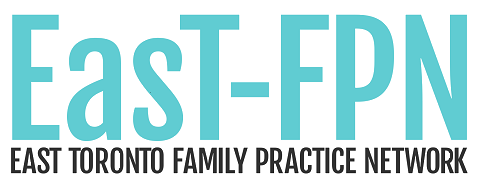Primary Care Open Forum Summary Document (Apr 27)
COVID-19 Support for Primary Care
Discussion Forum – April 27, 2022
To support primary care during the COVID-19 pandemic, East Toronto Family Practice Network (EasT-FPN), in collaboration with Michael Garron Hospital’s Dr. Jeff Powis - Medical Director, IPAC, hosts a virtual Primary Care Q+A Open Forum to provide clinical & practice recommendations. Get additional practice support and strengthen East Toronto, by becoming a member of the EasT-FPN.
Key Updates & Summary of April 27 Discussion
Thursday May 5th, 7 p.m. to 8 p.m: SCOPE Orthopedic CME - Managing Common Fractures in Primary Care. Register here.
Using COVID-19 wastewater signal as surrogate for community data due to lack of access to PCR testing; currently unsure if there is a clear up or down trend, waiting for mid May for a clearer signal
Modest number of COVID-19 hospital admissions; majority of COVID-19 inpatients are related to staff/visitor exposure or admitted as secondary post-viral syndrome
Therapeutics are available for individuals at high risk for COVID-19 hospital admissions or having a poor outcome to exposure, particularly for the unvaccinated and/or immunocompromised
Physicians need to assess risk/benefit of prescribing Paxlovid; justification for use related to EPIC-HR study
Study population:
Unvaccinated
Median age 45, very few enrolled over 70
Majority treated within three days of symptom onset
7% of those taking the medication had to stop due to nausea/vomiting/diarrhea compared to 2% in the placebo group
Paxlovid shown to be very effective at preventing hospitalization secondary to COVID-19 and death due to any cause (reduced by ~88%); very little evidence of this effectiveness in vaccinated individuals
Can be challenging to administer Paxlovid within three days of symptom onset; early treatment initiation is recommended as with all viral respiratory tract infections
Physicians need to be mindful of which treatment assessment tools to use when assessing Paxlovid eligibility
Ontario Science Table (OST) evidence based guidelines are the gold standard
Provincial guidelines for Paxlovid eligibility is broader than OST guidelines and are not currently grounded in evidence or rationale
Please see the MGH COVID-19 therapeutics management guidelines summary
Physicians need to do a robust drug-drug evaluation prior to prescribing Paxlovid; COVID-19 drug-drug interactions tool
This tool indicates whether there is an interaction or not and what to do if there is
Most patients with greater than three risk factors who are over 70 years old will have a medication that will interact with Paxlovid and will require dose reduction
Paxlovid dose needs to be reduced in those with GFR > 30 and < 60; consult pharmacy for dose adjustment
Paxlovid is not recommended for GFR < 30 as its effects has not been well studied
MGH’s Covid-19 Outcome Assessment Team (COAT) helps to determine if Paxlovid treatment is necessary for an individual and to prescribe the medication, if appropriate
COAT is available at the MGH Clinical Assessment Centre every day from 9 a.m. to 5 p.m.
Please visit the MGH Clinical Assessment Centre page for more information on COVID-19 assessment, including a detailed process for accessing the COAT and therapeutics
Q: Is there a guideline for how long after the 3rd dose that a newly pregnant patient can/should get a 4th dose of COVID-19 vaccine?
A: The abortive capacity of the vaccine is much lower now than before due to the new variants. Vaccines likely need to have been administered in the proceeding eight weeks prior to exposure to be effective. Don’t think the 4th dose will have much added benefit in terms of preventing hospitalization for pregnant people at this moment. Not much value in vaccinating in-between waves, therefore can defer until five months after the last dose or wait until this fall or when the next wave arrives.
Q: What do we do about new upper respiratory infection symptoms within three months of confirmed (or assumed) COVID-19 infections? They are told not to retest?
A: With the new variants (BA. 1 & BA. 2), infected individuals likely won’t have much antibody protection left after about eight weeks. Recommend to reassess if exposed to COVID-19 after eight weeks. Cycle threshold data can be provided to physicians if their patients had their tests done at one of MGH’s testing sites.
Q: What about patients who test negative on the RATs but we assume they are positive based on exposure history (given the sensitivity is lower in RATs now)? They have symptoms of COVID-19 and have had household contacts or unmasked close work or school contacts. Should we wait three months prior to getting them boosted? And what should we be saying in letters for travel?
A: Yes to defer boost. Can defer until five months after the last dose or wait until this fall or when the next wave arrives. Letter: “Patient had presumed COVID-19 exposure with clinical compatible symptoms”.
Q: Can you comment on the 4th dose in healthy 60-70 year olds?
A: Don’t think the 4th dose will have much added benefit for healthy individuals with low risk of exposure.
Q: Any line of sight for vaccinations for 0-4 year olds?
A: Suspect that it’s coming. Public Health is pushing this forward however there have been some delays.
Q: Do the first three shots still work to prevent hospitalization and death?
A: Yes it still works.
Q: Is there any chance that this will wear off over time?
A: Suspect some form of regular boosting for COVID-19 annually similar to influenza.
